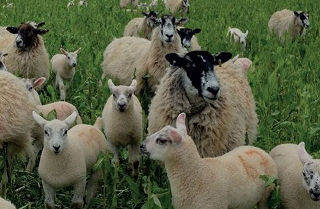The 16-page document discusses the many advantages of having sheep in arable systems, either for grazing short term crops such as stubble turnips or swedes, or longer-term grass and clover leys which may be growing for two or more years.
Phil Stocker, NSA chief executive, says: “50 years ago sheep were considered highly useful on arable farms. They supported the rotation and helped keep weeds and cereal pests at bay, while adding manure and nutrients following crops could use.
“Artificial fertilisers, herbicides and plant protection products, the specialisation of arable enterprises and the hassle factor of looking after animals, have all been responsible for the sheep sector’s sharp decline here. But now the tide seems to be turning as more arable farmers are looking to see how they can bring sheep back.”
The report highlights many advantages of keeping sheep on arable farms, including their beneficial effect on soil health and structure, how they can help control difficult weeds like blackgrass and improve the yields of subsequent crops.
It offers practical guidance on growing crops to feed sheep as well as infrastructure needed like fencing and water, while outlining additional rules and regulations which come with keeping animals.
Mr Stocker continues: “With the aim of getting an increasing number of arable farmers to consider the benefits sheep could bring to their system, the report concludes with a checklist of questions for arable farmers to see if sheep really could be the answer to their arable problems.
Case studies in the report demonstrate sheep are already doing very good things on arable farms across the UK, and those considering this option will find a list of possible business structures which can be adopted and modified depending on individual circumstances.”
We hope this guide offers inspiration, ideas and guidance to arable farmers as well as sheep farmers looking for new places to graze their sheep.
View the full report at www.nationalsheep.org.uk/policy-work or request a hard copy from< enquiries@nationalsheep.org.uk>




